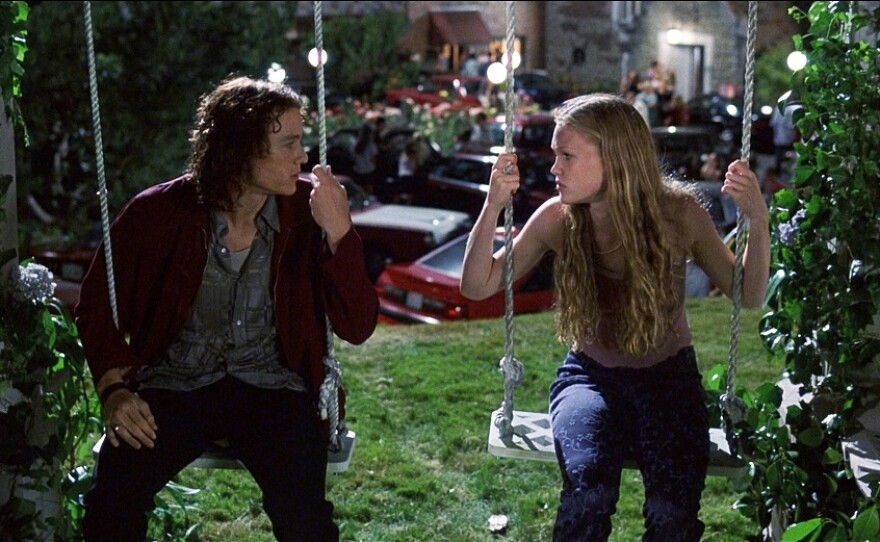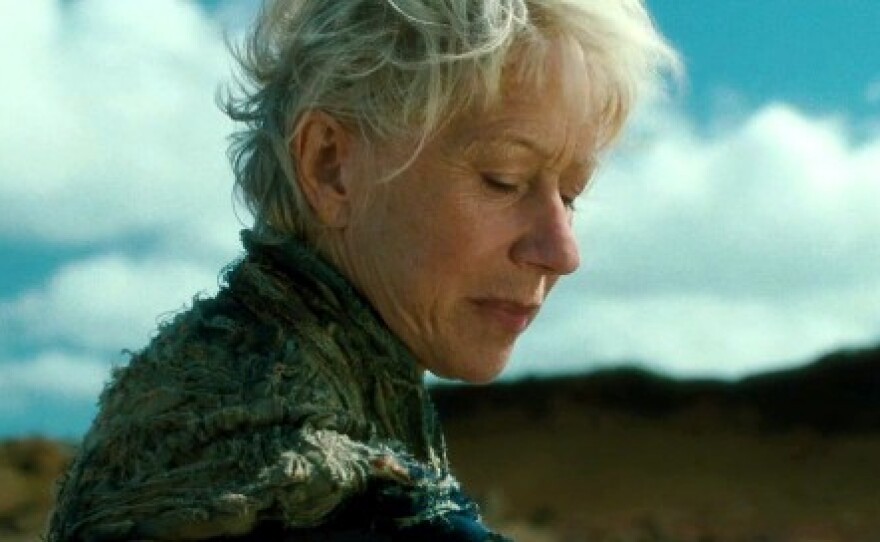D.J. Hopkins of San Diego State’s School of Theatre, Television and Film has curated a First Folio film series at the downtown library, and it offers a diverse range of Shakespeare film adaptations.
Kudos to Hopkins for using the Folio film series to encourage us to look at Shakespeare through fresh eyes. He has programmed nothing from Laurence Olivier or even Kenneth Branagh, filmmakers whose works are almost always considered the gold standard for filming the Bard. And while Olivier and Branagh have delivered some stellar cinematic Shakespeare, their approaches tend toward the classical.
The films selected for the Folio film series display a distinct sense of throwing caution to the wind and purists be damned. The series kicked off last Thursday with Julie Taymor’s “The Tempest” featuring a gender-bending turn by Helen Mirren as Prospera rather than Prospero. The film was poorly distributed and never received a theatrical run in San Diego.
Taymor’s earlier “Titus” had been well-received but her take on “The Tempest” got a lukewarm reception from critics and slipped away quietly. But having the opportunity to see Mirren as Prospera on the big screen was great. She was brilliant and the film itself (available on iTunes and Amazon Video) was a cleverly stylized take on the Bard’s retirement play.
Following the screening, Hopkins moderated a discussion with Jennifer Thorn, associate artistic director of MOXIE Theatre. Each film in the series will be followed by a discussion with different guest speakers as well as a Q&A with the audience.

"Throne of Blood," June 16
The film series continues Thursday with “Throne of Blood,” Akira Kurosawa’s bold samurai take on “Macbeth.” It’s a stunning adaptation set in medieval Japan during a period of feudal strife.
Kurosawa came up with a breathtaking mix of old and new, east and west by employing elements from Japan’s highly stylized Noh Theatre as well as from the American Western.
But is an adaptation that doesn't use a single line from Shakespeare still a Shakespearean adaptation? The answer, for me, is absolutely. The film shows how Shakespeare understood human nature and the human condition so well that he can be translated to any time or culture. Kurosawa uses imagery and sound rather than Shakespeare’s lines to tell the story, but his film captures the themes and essence of the play.
Trivia note: The arrows shot at actor Toshiro Mifune are real. That’s right, Kurosawa had real arrows fired at his actor to elicit real terror.

"Hamlet," June 23
To be or not to be … After 400 years that is still the question — and each generation seems to feel a need to formulate its own answer. Michael Almereyda’s “Hamlet” starring Ethan Hawke as the melancholy Dane takes place in contemporary New York and was shot, as Almeyreyda puts it, fast and cheap in 16mm.
The president of the Denmark Corporation is found dead. The grieving son, Hamlet, returns home to New York just in time for a press conference in which Uncle Claudius (Kyle MacLachlan) announces his takeover of the Denmark Corporation, his marriage to Hamlet's mother Gertrude (Diane Venora) and his dismissal of Fortinbras' threats of a hostile takeover.
Welcome to Hamlet for the new millennium.
In this world of global corporations, laptop computers, surveillance cameras and palm-sized camcorders, Hamlet is a would-be video artist who’s trying to make sense of the images that surround him. After a visitation from the ghost of his father (Sam Shepard), Hamlet suspects his uncle of foul play. As a test, Hamlet makes an experimental video titled "The Mousetrap" in which he'll catch the conscience of Claudius. Then he screens the video for the elite of the Denmark Corporation and ruffles the feathers of the image conscious Claudius. Now, Hamlet must take up the cause of avenging his father’s death.
Shakespeare purists will no doubt be offended by Almereyda’s approach. He liberally cuts the text so that the traveling players and the gravedigger are completely gone.
He reshuffles scenes so that the “What a piece of work is man” soliloquy now begins the film while many later scenes are started, stopped and then completed with Hamlet phoning in the final lines. And he updates the play to contemporary life so that Hamlet delivers “To be or not to be” in the action aisle of Blockbuster and the closing lines are typed on a teleprompter and delivered as part of the evening news by Robin MacNeil.
Is this sacrilege? Or is it simply a way of reinventing Shakespeare for a new generation? I believe the latter.
Despite some flaws, Almereyda’s "Hamlet" offers an invigorating re-imagining of Shakespeare’s play. Hamlet’s ability to repeatedly play lines on his video machines allows Shakespeare’s text to come alive in new ways. The film also makes poor Ophelia (Julia Stiles) a greater accomplice in her father’s duplicitous plans because when she meets with Hamlet she wears a wire like an informant. Plus, the players may be gone but this Y2K Hamlet now looks at images of James Dean and wonders what the young actor would do. In fact, Dean would have been perfect playing Hamlet in Almereyda’s film; he’s an icon of troubled youth and his method approach suits the characters troubled search for proper motivation for his actions.
In essence, Almereyda presents Hamlet and Ophelia as mixed up kids not unlike James Dean and Natalie Wood in “Rebel Without a Cause.” Hamlet and Ophelia seem like poster kids for teen suicide awareness. They both appear suicidal from early on and their respective parents fail to understand them and fail to provide good role models. The youthfulness of Hamlet makes his suicidal thoughts as well as his indecision make more sense. And his tragedy is all the greater because of the potential loss.
Almereyda calls Hamlet a great echo chamber, it absorbs and amplifies the voice of everyone who enters it. His approach offers an exciting, modern, sometimes flawed adaptation of Hamlet that redefines the Bard’s character for a new generation. And that’s the way it should be, each generation needs to discover what Hamlet has to say to them.

"10 Things I Hate About You," June 30
With “10 Things I Hate About You,” writers Karen McCullah and Kristen Smith take Shakespeare’s “Taming of the Shrew” and transfer it to a contemporary setting.
Now we have the castle-like setting of Padua High School where the pretty and popular Bianca grows increasingly frustrated with the restrictions on her social life. Bianca’s inability to date prompts her lovesick suitors to try and find a match for her sister, the caustic Kat.
In the past, Hollywood has used famous off-screen couples like Mary Pickford and Douglas Fairbanks, and later Richard Burton and Elizabeth Taylor to add onscreen fire to the Bard’s lively battle of the sexes. In “10 Things I Hate About You,” the roles are played by newcomers Julia Stiles and Heath Ledger, who play well off of each other as they reluctantly fall in love.
As written by McCullah and Smith, this battle of the sexes seems to borrow more from Shakespeare’s “Much Ado About Nothing” than “Taming of the Shrew” because the combatants are placed on more equal footing and enjoy the challenge of their verbal encounters. Gone is the underlying sexism that can make “Taming of the Shrew” troublesome for contemporary audiences.
Ledger and Stiles score with their flashy roles but the standout of the young cast is Larisa Oleynik as Bianca. She gives subtle shadings to what could have been simply an airhead role.
Director Gil Junger, who comes from TV, relies too much on a calculated soundtrack to set the tone. He also makes the film too cute and sitcom-y, leaving long pauses that beg for a laugh track. But he can’t take all the edge out of the clever script by McCullah and Smith. The writers give us that rare thing: a savvy teen comedy that has well developed characters, explores real issues, and doesn’t make a villain out of everyone over 30.
Like “Clueless” from a few years back, “10 Things I Hate About You” deals with peer pressure and champions those who defy conventions and insist on being different.

"Caesar Must Die," July 7
The last film in the series is the only one I have not seen and I am excited at the prospect of catching “Caesar Must Die” for the first time on the big screen.
Made by Paolo and Vittorio Taviani in 2013, the film follows inmates at a high-security prison in Rome as they prepare for a public performance of “Julius Caesar.” Shakespeare’s politic play about ambition and betrayal is reimagined in this Italian semi-documentary. The people in the play are all indeed prisoners but there is also a sense that some of their scenes have been staged and rehearsed to some degree.
The film’s the thing with the Folio film series so get thee to the library and appreciate this unconventional Shakespeare film adaptations.
Film screenings are free but it is recommended to reserve a ticket online for "Throne of Blood," "Hamlet," "10 Things I hate About You," and "Caesar Must Die."






